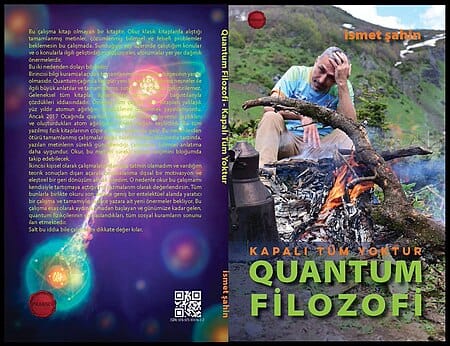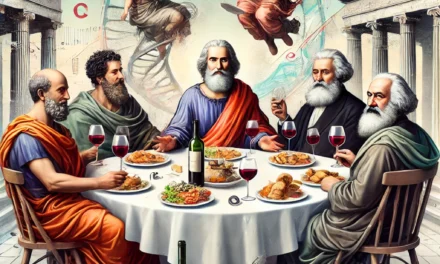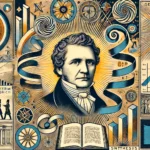
İsmet Şahin’s Philosophy: Challenging Classical Physics and Social Theory

İsmet Şahin’s Philosophy: Challenging Classical Physics and Social Theory
İsmet Şahin presents a groundbreaking exploration of the intersection between quantum mechanics, philosophy, and social theory. His work critiques traditional metaphysical and scientific frameworks, arguing for the necessity of moving beyond deterministic and closed-system models. Şahin’s insights are particularly timely in light of contemporary advancements in quantum theory, which challenge long-held beliefs in classical physics and offer new ways of understanding the nature of reality.
Challenging Classical Physics: The Limits of Determinism
The book opens with a critical examination of the limitations of classical physics, particularly the Newtonian model. Şahin emphasizes how the rigid, deterministic nature of classical mechanics has misled various fields into viewing natural and social phenomena as closed systems governed by immutable laws. He asserts:
“The determination of all phenomena within a closed system is misleading; the dynamic structure of nature and social phenomena is based on uncertainty and probabilities” (p. 15)¹.
This perspective highlights the philosophical implications of quantum mechanics, which introduces uncertainty and probability as foundational elements of reality. By critiquing the deterministic worldview, Şahin questions the adequacy of classical physics in explaining the complexities of both the universe and human societies.
No Closed Totality: The Open Nature of Reality
A central tenet of Şahin’s argument is encapsulated in the phrase “Kapalı Tüm Yoktur” (There Is No Closed Totality). He applies this concept not only to the physical universe but also to social theory, challenging classical and positivist models that seek to explain phenomena through all-encompassing theories. Şahin articulates:
“There is no closed totality; everything is open, variable, and in a continuous state of evolution” (p. 25)².
By emphasizing the open-ended nature of both the cosmos and human societies, Şahin contends that uncertainty and randomness are inherent characteristics of existence. This rejection of closed systems challenges both the deterministic nature of classical physics and the reductionist tendencies found in traditional social theory.
Quantum Cognition: Rethinking Knowledge and Epistemology
In discussing quantum cognition, Şahin extends these ideas into the realms of knowledge and epistemology. He critiques reductionist approaches found in both materialist and idealist traditions, suggesting that neither perspective adequately captures the complexities of the mind-matter relationship, particularly in light of quantum discoveries. He states:
“Knowledge does not possess a fixed structure; on the contrary, it is a process based on probabilities and is continuously evolving” (p. 42)³.
This view calls for a new epistemological framework rooted in quantum thinking, where knowledge is seen as evolving rather than fixed. Şahin’s perspective challenges the traditional understanding of knowledge as a static body of information, proposing instead that it is a fluid and dynamic process shaped by uncertainty, much like the phenomena observed in quantum mechanics.
Marxism and Quantum Theory: A Radical Reappraisal
Şahin also critically engages with Marxist social theory, arguing that its reliance on deterministic materialism fails to account for the dynamic and unpredictable nature of physical and social realities. He suggests:
“The deterministic approach of Marxism ignores the dynamic structure of both physical and social realities” (p. 58)⁴.
By incorporating the insights from quantum mechanics into his critique, Şahin calls for a reevaluation of how we understand social structures, class struggle, and human agency. He argues that just as quantum theory has transformed our understanding of the physical world, it should similarly prompt a radical reevaluation of social theory. The traditional Marxist view, which operates within a deterministic framework, must be adapted to accommodate the uncertainties and dynamic interactions present in both physical and social contexts.
The Role of Uncertainty and Evolution in Social Theory
For Şahin, the application of quantum principles to social theory is not merely an intellectual exercise but a necessary step in advancing our understanding of human societies. Classical social theories, which often rely on static models of power, class, and economics, cannot fully account for the complexities and fluidity of contemporary social phenomena. As Şahin asserts:
“Social reality is not a closed system; it is continuously evolving, shaped by unpredictable forces and historical contingencies” (p. 67)⁵.
This insight challenges traditional Marxist and positivist approaches to social theory, which often rely on fixed laws or deterministic frameworks to explain social change. Instead, Şahin advocates for a model of social theory that is open-ended, adaptable, and responsive to the uncertainties of the world.
Critical Perspectives on Şahin’s Philosophy
While Şahin’s arguments present a compelling case for rethinking established frameworks, there are several critical dimensions that warrant closer examination. His assertion that “There is no closed totality” presents a significant departure from the foundational tenets of classical philosophy, which often sought universal truths. This rejection of totality could be seen as relativistic, raising questions about the stability and coherence of knowledge itself. If all knowledge is open to continual change and evolution, can any framework or theory ever be considered valid or useful?
Furthermore, Şahin’s critique of Marxism, while well-founded, may overlook the ways in which contemporary Marxist thought has evolved. Scholars within the Marxist tradition, particularly those influenced by post-structuralism and dialectical materialism, have sought to integrate elements of complexity and dynamism into their analysis of class and social relations. By framing his critique solely in terms of classical Marxism, Şahin risks ignoring these rich dialogues that have emerged within the broader Marxist discourse.
Additionally, the application of quantum principles to social theory raises its own set of challenges. The complexities of human societies and the intricacies of social interactions may not map neatly onto the probabilistic and non-deterministic nature of quantum mechanics. Critics might argue that while quantum mechanics offers a revolutionary lens for understanding the physical world, applying its principles directly to social phenomena could lead to oversimplification or misinterpretation of social dynamics.
Quantum Philosophy: A Paradigm Shift in Philosophy and Social Theory
In conclusion, Quantum Philosophy offers a provocative philosophical inquiry that merges quantum mechanics with broader questions of reality, knowledge, and social theory. Şahin’s work advocates for a paradigm shift in how we conceptualize everything from the laws of physics to the dynamics of social systems, championing a model that embraces openness, uncertainty, and continual change. He encapsulates this sentiment with a compelling assertion:
“To create a new world-view, we must accept uncertainty and change” (p. 75)⁵.
By blending quantum mechanics with philosophical inquiry, Şahin challenges readers to reconsider established beliefs and embrace a more fluid understanding of existence. The book ultimately serves as a call to rethink the way we approach both the physical universe and the social systems in which we live, urging us to adopt a perspective that acknowledges the ever-evolving, uncertain nature of both.
References:
- Şahin, İsmet. Quantum Philosophy. p. 15.
- Şahin, İsmet. Quantum Philosophy. p. 25.
- Şahin, İsmet. Quantum Philosophy. p. 42.
- Şahin, İsmet. Quantum Philosophy. p. 58.
- Şahin, İsmet. Quantum Philosophy. p. 75.
Footnotes
- Şahin, Quantum Philosophy , p. 15: “The determination of all phenomena within a closed system is misleading; the dynamic structure of nature and social phenomena is based on uncertainty and probabilities.”
- Ibid., p. 25: “There is no closed totality; everything is open, variable, and in a continuous state of evolution.”
- Ibid., p. 42: “Knowledge does not possess a fixed structure; on the contrary, it is a process based on probabilities and is continuously evolving.”
- Ibid., p. 58: “The deterministic approach of Marxism ignores the dynamic structure of both physical and social realities.”
- Ibid., p. 75: “To create a new worldview, we must accept uncertainty and change.”
Review
98%
Summary By blending quantum mechanics with philosophical inquiry, Şahin challenges readers to reconsider established beliefs and embrace a more fluid understanding of existence, while also inviting critical engagement with the implications of his assertions.





















